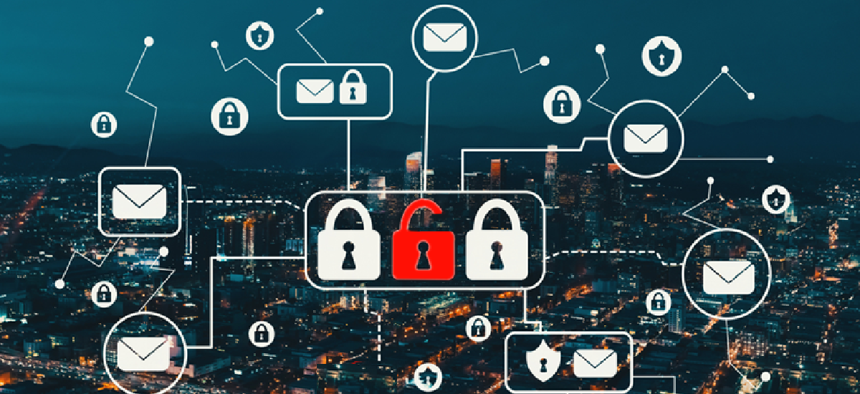Connecting state and local government leaders
Targeted instances of intrusion, fraud or damage by malicious actors rose sharply since 2017, according to a new cybersecurity report.
Many of the cyberattacks on state, local, tribal and territorial governments are not complicated and could be avoided through simple steps such as improved cyber hygiene and two-factor authentication, a new report states.
Since 2017, attacks – which the report defines as targeted instances of intrusion, fraud or damage by malicious cyber actors rather than discovery of insecure databases or accidental online leaks – rose an average of almost 50%, according to the “State and Local Government Security Report” that BlueVoyant, a cybersecurity firm, released Aug. 27. That amount that is likely only a fraction of the true number, the report adds.
The research confirmed the company’s belief that active threat targeting happens across the board. “For every selected county’s online footprint, evidence showed some sign of intentional targeting,” the report states. What’s more, five counties -- or 17% of the 28 studied -- showed signs of potential compromise, indicating that traffic from governments assets was reaching out to malicious networks.
“There’s a collective risk here because there is no standardization,” said Austin Berglas, former FBI special agent in New York and head of ransomware/incident response at BlueVoyant. “You have certain state and locals that are on dot-coms and dot-us or dot-orgs. One would think that these should be on the dot-gov domain because [that] means that you not only check the box as being a certified government site, but you get forced two-factor authentication and you’re always going to have HTTPS.”
Ransomware is the main way municipal assets are attacked. What’s more concerning than the growing number of attacks, however, is the increase in how much bad actors demand in ransom, the report states. Average ransom demands rose from a monthly average of $30,000 to nearly half a million dollars, with total monetary value of ransom demands reaching into the millions.
Even when cities don’t pay, the costs can be staggering. For instance, the 2019 ransomware attack on Baltimore cost the city more than $18 million in damages and remediation.
“The notion of ‘Hey, I’m small. The bad guys aren’t going to be targeting me’ is no longer applicable,” Berglas said. “The bad guys know how valuable” state and local government data is, so they go after the personally identifiable information in tax records or disrupt entire networks in an extortion attempt. “We’ve personally seen a municipality in the past year get completely compromised, locked up with ransomware and the entire 911 system was locked down.”
Other attack vectors include data breaches and typosquatting, in which threat actors impersonate trusted domains with near-identical website URLs, according to the report. “Such sites are often created as a means of advanced threat infrastructure: pre-positioning for many phishing, spear-phishing and [social media] influence campaigns,” it states.
The coronavirus response and upcoming presidential election have helped put cybersecurity in the limelight.
“We immediately expanded our attack surface immensely,” Berglas said of the pandemic. “If I’m an IT section of a company and I’ve got the responsibility of protecting and maintaining the endpoints -- the laptops, the computers, the phones -- and all of a sudden that just tripled, quadrupled in number and now my company is allowing people to use their own devices, [I need to know how] those devices managed,” he said. “Are there endpoint sensors on those devices to protect them? Are there containers that separate work from personal information? Is there data-loss protection capability on there? All of these questions come into play.”
In terms of election security, what’s at stake is not the potential for changing votes, but rather undermining faith in the process, he added. For instance, when people vote by mail, could votes tallied on a spreadsheet be locked up by a ransomware attack?
State and local governments can take three immediate steps to improve their security postures, Berglas said. The first is to implement password hygiene, or the use of complex passwords that automation would struggle to detect. Second is two-factor authentication, which deters bad actors who don’t want to have to take extra steps to gain access, and the third is a review of remote desktop protocols, including ensuring that ports are closed after employees finish using them.
Agencies can build on their security from there by accounting for sufficient backups, planning for defense-in-depth and following the least-privilege principle, which states that people on the network can access only the information they need to do their jobs. On top of that, Berglas said, agencies need visibility into the entire network so they can monitor it round-the-clock.
“Resiliency takes a front seat here,” he said.



